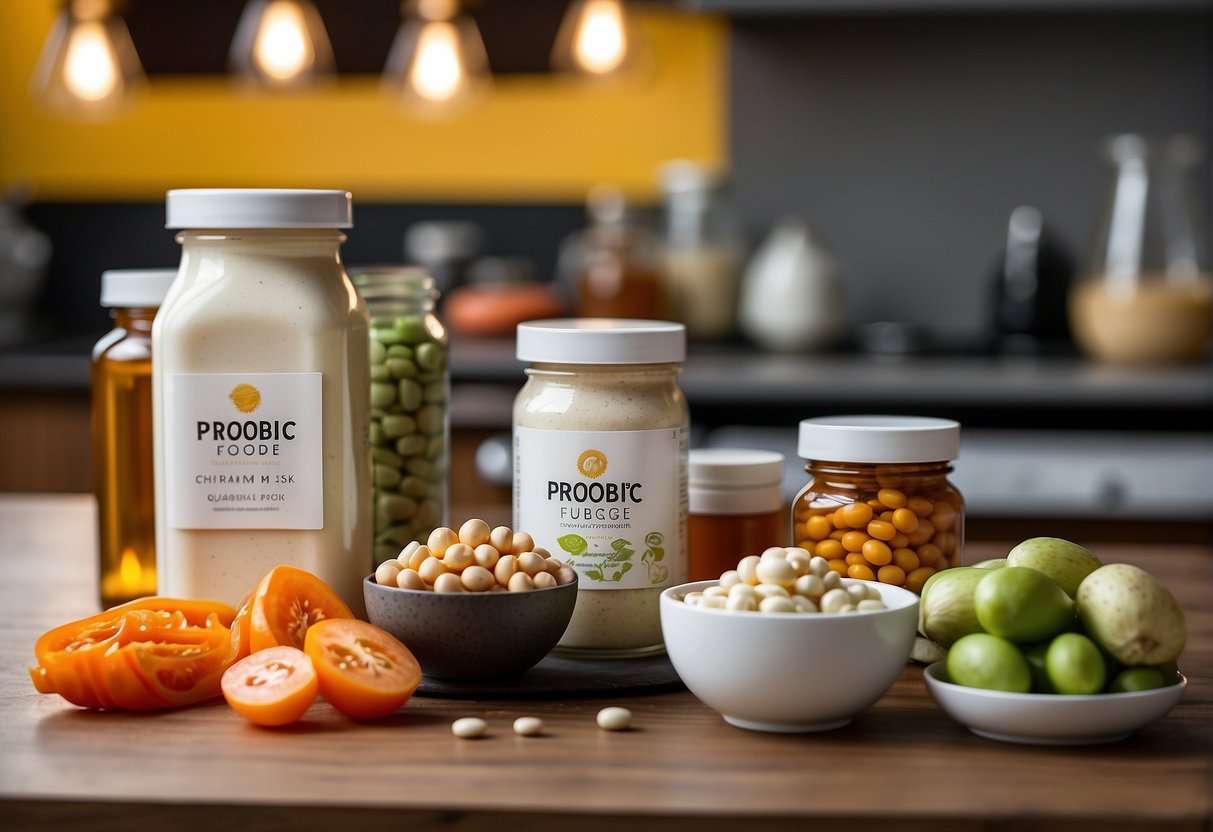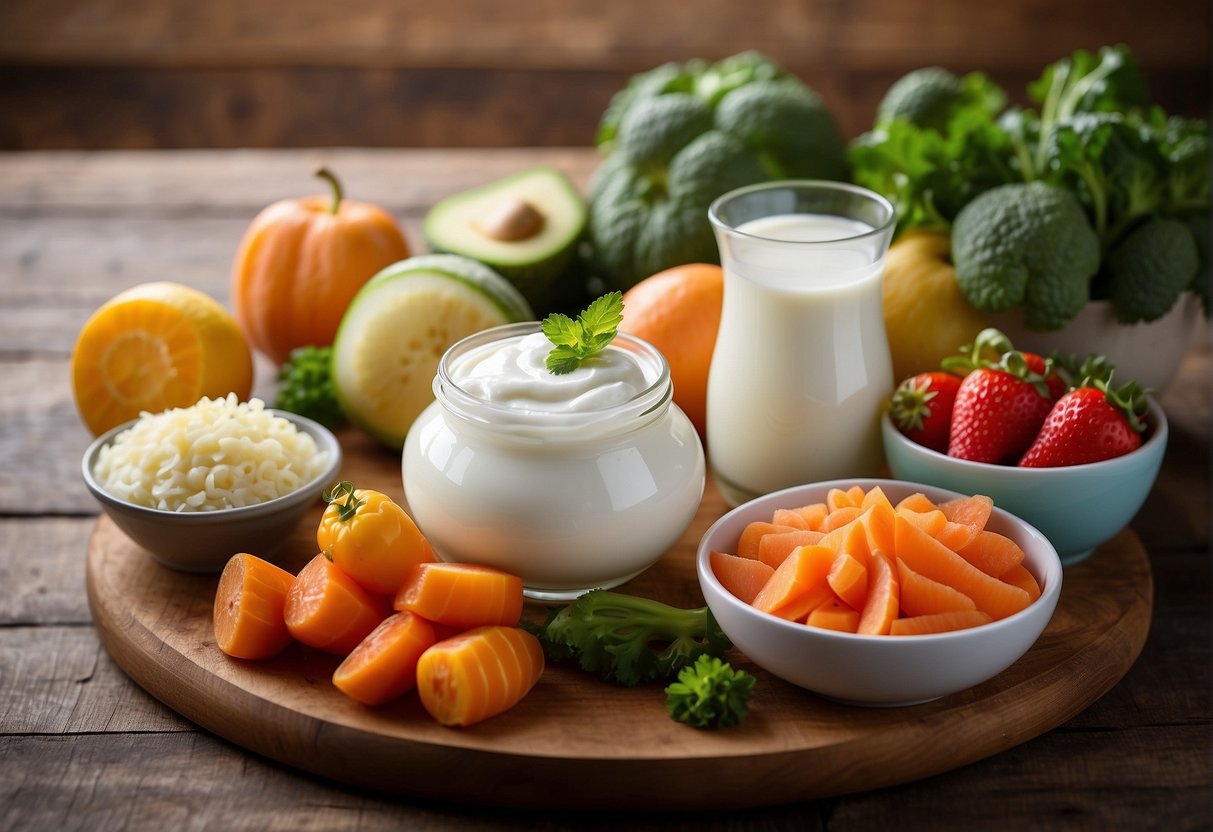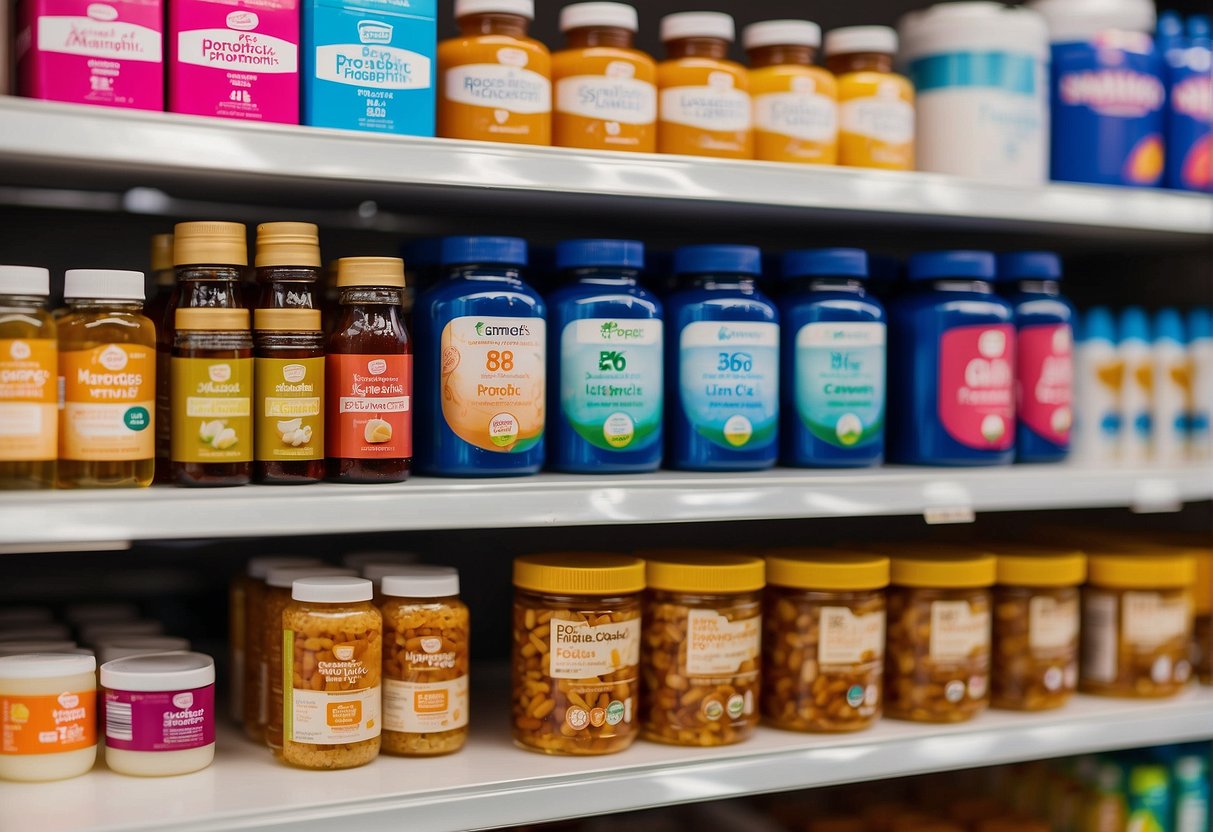Probiotics have garnered significant attention for their role in digestive health, but their benefits are especially relevant for women. These beneficial bacteria play a crucial role in maintaining gut health. They also support the unique physiological needs of the female body.
Women’s health concerns, such as vaginal flora balance, urinary tract health, and digestion, can be addressed through specific probiotic strains. Selecting the right probiotic involves understanding these strains, their benefits, and the compatibility with women’s health.
To maximize the effectiveness of probiotics, it’s not just about the strains, but also the quality and delivery mechanisms of the supplement. High-quality probiotic supplements ensure better survivability of the bacteria. This ensures they reach the gut where they can exert their benefits.
Integrating probiotics into one’s daily routine should be done with consideration of potential side effects. Also, consider the synergistic effects of combining them with prebiotics and a nutritious diet.
As the research on probiotics evolves, new innovations and products are constantly being developed, making the choice more diverse for consumers.
Key Takeaways
- Probiotics offer health benefits that are specifically beneficial for women, including vaginal and urinary tract health.
- High-quality supplements and the correct strains are crucial for the effectiveness of probiotics.
- Daily integration of probiotics into the diet should be done with consideration for individual health needs and potential side effects.
Probiotics and Their Importance for Women

Probiotics play a crucial role in maintaining women’s health by supporting the immune system and balancing the body’s natural flora.
What Are Probiotics?
Probiotics are live microorganisms that, when administered in adequate amounts, confer a health benefit on the host. These beneficial bacteria are similar to those naturally found in the human body, particularly in the gut. They come in various forms, including yogurts, supplements, and fermented foods.
The Link Between Probiotics and Women’s Health
In women, probiotics are particularly important for maintaining vaginal health. They help to prevent the overgrowth of harmful bacteria and yeast, which can cause infections.
Moreover, they play a role in the health of the urinary tract by reducing the risk of urinary tract infections (UTIs), which are more common in women.
Probiotics also contribute to the overall immune system functioning, offering protection against pathogens. Beyond the gut and reproductive health, these friendly bacteria can also impact skin health, promoting clearer and more resilient skin.
Choosing the Right Probiotic for Women
When selecting a probiotic supplement, women should focus on the particular strains, the potency indicated by colony-forming units (CFUs), and look for third-party testing to ensure product quality and safety.
Assessing Probiotic Strains and Their Benefits
Certain probiotic strains are better suited for addressing women’s health concerns.
Lactobacillus strains, for example, are commonly found in female reproductive systems and can help maintain a healthy vaginal flora.
It’s crucial to look for probiotics that specific benefits, such as Lactobacillus rhamnosus GR-1 and Lactobacillus reuteri RC-14, which are known to promote urinary and vaginal health.
Considering CFU Counts and Probiotic Potency
The CFU count, which stands for colony-forming units, measures a probiotic’s potency.
A higher CFU count often suggests more bacteria, which may enhance the probiotic’s effect. However, amounts ranging from 1 to 10 billion CFUs are usually sufficient for general health maintenance, while specific health concerns may require higher counts.
The Importance of Third-Party Testing and Certification
Third-party testing is a critical hallmark of quality assurance.
Supplements that have been third-party tested and certified give an added level of trust. They verify that what’s on the label is what’s in the bottle.
Checking for this certification helps ensure that the probiotics contain the advertised strains and CFU counts without contaminants.
Key Benefits of Probiotics for Women
Probiotics offer several health advantages specifically tailored for women, ranging from improved digestive health to enhanced mental wellness. They address various aspects of a woman’s physiology, providing support where it’s most beneficial.

Supporting Vaginal and Urinary Tract Health
Probiotics, particularly strains like Lactobacillus, promote a healthy balance of flora in the vaginal area.
This is essential for preventing infections such as bacterial vaginosis and urinary tract infections. Regular intake of these beneficial bacteria can help maintain an acidic environment, deterring harmful pathogens and supporting overall vaginal health.
Enhancing Digestion and Preventing Bloating
Certain strains of probiotics, like Bifidobacterium, are known to assist in the digestive process, alleviating common issues such as bloating.
They work by enhancing the gut flora, which plays a crucial role in the breakdown of food and absorption of nutrients. This ensures a smoother digestion process and less discomfort from gas.
Bolstering the Immune System
A robust immune system relies significantly on a healthy gut, and probiotics contribute to this by reinforcing the body’s natural defenses.
By crowding out harmful bacteria and producing substances that can neutralize pathogens, probiotics such as Lactobacillus and Bifidobacterium are vital in maintaining one’s immune health.
Probiotics and Mental Health
There’s a growing body of research suggesting a link between gut health and mental well-being.
Probiotics may play a role in reducing symptoms of stress and anxiety by modulating the gut-brain axis. A healthy gut is said to send positive signals to the brain, potentially leading to improved mental health.
Nutritional Synergy: Prebiotics, Synbiotics, and Diet

Nutritional synergy plays a critical role in gut health, especially for women. The efficacy of probiotics is greatly influenced by prebiotics and the overall diet, which can enhance or diminish their benefits.
The Role of Prebiotics in Probiotic Effectiveness
Prebiotics are dietary fibers that feed the beneficial bacteria in the gut, thus increasing the effectiveness of probiotics.
These prebiotic fibers, often found in foods like garlic, onions, and bananas, act as fuel for the growth and activity of probiotics.
By fostering a conducive environment, prebiotics enable probiotics to flourish, contributing to a balanced microbiome.
Synbiotics: Combining Prebiotics and Probiotics
Synbiotics represent a combination of prebiotics and probiotics that work together to promote gastrointestinal health.
This synergistic relationship ensures that the probiotics reach the gut with the necessary nutrients to thrive.
Synbiotics can be particularly beneficial since they not only introduce beneficial bacteria but also ensure the nutrients needed for these bacteria are present.
Examples of synbiotic products may include certain yogurt and kefir varieties that are fortified with both probiotic strains and prebiotic fibers.
Dietary Considerations for Optimal Probiotic Performance
A diet rich in prebiotic fiber and fermented foods can enhance probiotic performance and overall gut health.
Fermented foods, like sauerkraut, kimchi, and miso, offer a natural source of probiotics.
Incorporating a diverse range of these foods into one’s diet, along with sources of prebiotic fiber such as asparagus and chicory root, can create a robust environment for probiotics to work effectively.
It’s important for women to consider their overall dietary patterns, as they can have a profound impact on the success of probiotic supplementation and the maintenance of a healthy microbiome.
Essential Features of High-Quality Probiotic Supplements

When considering probiotic supplements, it’s crucial to focus on factors ensuring their potency, purity, and efficacy. These include the forms of probiotics, their storage requirements, and their ingredient integrity.
Understanding Probiotic Supplement Forms
Probiotic supplements commonly come in several forms including capsules, tablets, powders, and liquids.
Capsules are a popular choice because they often contain a shelf-stable design that protects the probiotics inside from moisture and heat, allowing them to be potent without the need for refrigeration.
It’s important to verify if a product requires refrigeration after opening, as this can impact the viability of the probiotics.
The Significance of Supplement Storage and Handling
The effectiveness of a probiotic supplement can be largely affected by how it’s stored and handled.
Supplements that are shelf-stable do not require refrigeration and can maintain their potency at room temperature, making them convenient for travel.
However, some high-quality probiotic strains may need refrigeration to prolong their viability. Always check the storage instructions to ensure that the supplement maintains its intended effectiveness.
Identifying Clean-Label Probiotic Supplements
Clean-label probiotic supplements cater to those looking for a natural product with minimal additives.
They are often gluten-free, non-GMO, and free from common allergens like dairy, soy, and even unnecessary fillers.
It’s key to find supplements that list these features explicitly, assuring consumers of their commitment to purity and natural ingredients, which are deemed as vital components for those attentive to their dietary intake.
Integrating Probiotics into Your Daily Routine
To optimize the benefits that probiotics offer, understanding how to effectively integrate them into your daily life is crucial.
This includes knowing the best time and quantity for consumption, how to maintain your regimen while traveling, and when to seek expert advice for personalized guidance.

Optimal Dosage and Timing for Probiotics
Finding the correct dosage for probiotics is essential.
Strains like Lactobacillus acidophilus or Bifidobacterium lactis can be found in various supplements, and manufacturers often recommend one to two servings per day.
It is crucial to ingest probiotics at a time when they are most likely to survive stomach acid. This is typically 30 minutes before or concurrently with a meal or snack that contains some fat.
Managing Probiotics While Traveling or Under Stress
Traveling and stress can disrupt your digestive system, and maintaining a routine with probiotics can help.
Opt for probiotic strains such as Lactobacillus rhamnosus and Bifidobacterium longum, which have been noted for their resistance to stomach acid and bile.
Portable, shelf-stable formulations are preferable when one is on the move.
During periods of high stress, consistent probiotic intake can support gut health, which is closely linked to the body’s stress response.
Consulting Healthcare Professionals for Personalized Advice
Consultation with healthcare professionals is important when tailoring probiotic supplementation to individual needs, such as specific digestive concerns or immune support.
Experts can recommend particular strains and dosages that cater to personal health profiles.
For instance, a healthcare professional may suggest a higher dose of Lactobacillus acidophilus for someone dealing with a bacterial imbalance, while someone with a healthy gut may require a standard maintenance dose.
Potential Side Effects and Considerations

When selecting probiotics for women, it is important to consider possible side effects and how these supplements might interact with other medications.
Understanding Probiotics and Digestive Discomfort
Probiotics can sometimes lead to digestive issues such as diarrhea or constipation, especially when first introducing them to one’s regimen.
While these symptoms may indicate that the body is adjusting to the new bacterial balance, they typically resolve within a few weeks.
If discomfort persists, it is advisable to consult a healthcare professional.
Probiotics and Interactions with Medications
Probiotics can interact with certain medications, notably antibiotics.
Antibiotics may reduce the efficacy of probiotics by destroying both harmful and beneficial bacteria. Conversely, certain probiotic strains might diminish the antibiotic’s effectiveness.
To maintain immune function and gut health during antibiotic treatment, timing the intake of probiotics is crucial. They are usually recommended to be taken a few hours after antibiotics to minimize interaction.
Exploring Probiotic-Rich Foods and Alternatives

Probiotics offer a plethora of health benefits, particularly for women. This section covers the advantages of traditional sources like yogurt, identifies plant-based alternatives suitable for vegan and vegetarian diets, and discusses the efficacy of supplements compared to food sources.
Benefits of Probiotic Foods Like Yogurt and Kefir
Probiotic-rich foods such as yogurt and kefir are widely acknowledged for their beneficial bacteria, which support gastrointestinal health and boost the immune system.
Yogurt, created through the fermentation of milk by lactic acid bacteria, is particularly noted for enhancing digestion and maintaining vaginal health.
Similarly, kefir, a fermented dairy product, is populated with an even greater diversity of live cultures, often making it a more potent source of probiotics.
Vegan and Vegetarian Probiotic Options
For those following a vegan or vegetarian diet, there are numerous non-dairy sources of probiotics available.
Fermented foods such as sauerkraut, kimchi, and tempeh provide beneficial bacteria without the need for dairy.
Additionally, certain brands offer dairy-free yogurt alternatives made with coconut, almond, or soy bases that are fortified with probiotics, ensuring that those on plant-based diets can still reap the benefits of probiotic foods.
Supplement Versus Food Sources of Probiotics
When considering supplements versus food sources of probiotics, one should weigh the convenience of probiotic supplements against the additional nutritional benefits of probiotic-rich foods.
Supplements provide a precise strain and number of probiotics, which can be beneficial for specific health concerns. However, foods like yogurt not only supply a variety of live cultures but also offer other nutrients such as protein, calcium, and vitamins.
Consulting with healthcare providers can guide individuals to the most suitable choice for their health needs.
Probiotic Innovations and Emerging Research

Recent developments in probiotics spotlight the focal role of these beneficial bacteria in women’s health. Studies increasingly confirm their impact, while technological advancements are enhancing how they are delivered into the digestive system.
Recent Studies on Probiotic Efficacy and Women’s Health
Researchers have reinforced the connection between probiotics and the gut microbiome, pinpointing their influence on nutrient absorption and overall health.
Specific probiotics are identified to support women by optimizing the gut microbiome’s constitution, suggesting tailored probiotic regimens could be beneficial. A study affirms the efficacy of targeted strains in addressing women’s unique health needs.
Advancements in Probiotic Technology and Delivery
Innovators have developed novel methods to enhance probiotic viability through encapsulation techniques, ensuring their survival through the acidic environment of the stomach.
The new methodologies pave the way for higher efficacy upon reaching the intestines. Significant progress has been made in ensuring these strains can be effectively delivered and integrated into the gut microbiome.
Future Directions in Probiotic Development
The horizon holds promise for probiotics tailored to individual microbiomes, offering personal health solutions.
Future research aims to leverage the understanding of the gut microbiome to enhance women’s health through precise probiotic formulations. This could mark a shift in how probiotics are applied, moving towards a more personalized approach to bolster nutrient absorption and overall wellbeing.
Choosing the Best Probiotic Brands and Products

Selecting the right probiotic is crucial for ensuring maximum health benefits. Women should consider specific strains, brand reputation, and value when choosing a product.
Criteria for Selecting Top-Quality Probiotic Brands
When looking for top-quality probiotic brands, one should assess the number of strains included in the product, since a variety often helps address multiple areas of health.
Brand transparency and clinical evidence of efficacy also weigh heavily in the decision-making process.
Probiotics such as Culturelle and Garden of Life have established themselves in the market with a reputation for quality.
However, newer entries like Ritual Synbiotic+ and Seed DS-01 Daily Synbiotic underscore innovation with their scientifically-backed formulations.
Best overall value is evaluated on a combination of cost-effectiveness and the brand’s reliability. A higher price does not always equate to better quality, so it’s wise to consider affordability alongside the abovementioned criteria.
Highlighting Notable Probiotic Products
Product Table:
| Brand | Strain Composition | Cost | Unique Selling Point |
|---|---|---|---|
| Garden of Life | Multiplicity of strains | Mid-range | Includes 32 different bacterial strains |
| Culturelle | Primarily Lactobacillus GG | Mid-range | Acknowledged for brand trust and digestive health focus |
| Seed DS-01 Daily Synbiotic | Broad spectrum with prebiotics | Higher | Touted for subscription-based convenience |
| Ritual Synbiotic+ | Clinically-studied strains | Higher | Emphasizes sustainability and traceability |
In the subsection above, a table format condenses product specifics to facilitate comparison. This selection demonstrates broad-spectrum efficacy and consumer trust, which are important in choosing a probiotic for women.
Frequently Asked Questions
In this section, readers will find concise, evidence-based answers to common queries regarding the efficacy and application of probiotics for women’s health issues.
What is the most recommended probiotic for improving vaginal health?
For vaginal health, specific strains like Lactobacillus rhamnosus and Lactobacillus reuteri are often recommended. These strains are found in products such as Garden of Life RAW Probiotics, which boast a high bacteria CFU count.
How do probiotics influence weight loss in women?
Research suggests that probiotics may influence weight loss by affecting appetite and fat storage. However, the effects are dependent on the individual and the specific strains of bacteria. This makes it crucial to choose a probiotic that is tailored to one’s health needs.
Which probiotics are suitable for women over 50 for optimal health?
Women over 50 may benefit from probiotics that support immune and bone health. Strains like Bifidobacterium can be particularly beneficial, as found in probiotics such as NOW Women’s Probiotic 20 Billion Veg Capsules.
What are the top-rated probiotics for enhancing gut health?
Top-rated probiotics for gut health often contain a blend of multiple strains. Products like Seed DS-01 Daily Synbiotic are praised for their subscription-based delivery and well-rounded formulation designed for digestive balance.
Can probiotics effectively alleviate constipation in women?
Certain probiotics are known to help regulate bowel movements and may alleviate constipation. Strains such as Bifidobacterium and Lactobacillus have shown positive results in improving bowel regularity in women.
Are there specific probiotics that help reduce vaginal odor?
Probiotics like Lactobacillus strains may help in reducing vaginal odor by maintaining a healthy microbiome balance.
Products like Jarrow Fem-Dophilus Advanced are among those specifically formulated for this purpose.